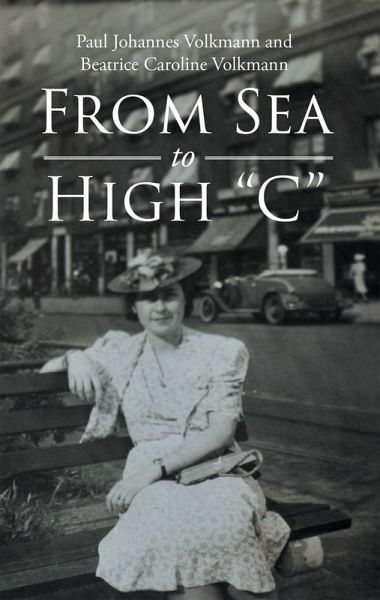
From Sea to High "C" (eBook, ePUB)

PAYBACK Punkte
4 °P sammeln!
When Beatrice C. Volkmann realized in her teens that she had a passion to improve her vocal ability, she embarked on a journey that would take her to Germany to pursue her passion for singing. The book describes Beatrice's life in the United States and Germany in the 1930s. At the start of her journey, Beatrice was both innocent and idealistic. In search of becoming a professional singer, her life was influenced by a number of people from all walks of life. She spent her early youth in a number of schools in Germany and America, never in one place for long periods of time. After school, Beatri...
When Beatrice C. Volkmann realized in her teens that she had a passion to improve her vocal ability, she embarked on a journey that would take her to Germany to pursue her passion for singing. The book describes Beatrice's life in the United States and Germany in the 1930s. At the start of her journey, Beatrice was both innocent and idealistic. In search of becoming a professional singer, her life was influenced by a number of people from all walks of life. She spent her early youth in a number of schools in Germany and America, never in one place for long periods of time. After school, Beatrice went to Europe to learn to sing, and that was her goal. She found herself being challenged by teachers and by life in Germany at this time. In the midst of her journey, she recalls episodes involving friends, relatives, success, failure, and romance, all of which, in the end, brought joy and sorrow to her life. The book's story line is about a young girl aspiring to be an accomplished singer and moving from place to place to accomplish her goal. It is a historical document, which not only educates readers of the peaceful setting that Germany initially provided between World War I and the Second World War, but also describes how, slowly but surely, Hitler brainwashed German citizens into thinking non-Arians (Christians, Jews) were contaminating German society. She bore witness to Nazi propaganda and lost friends because of their heritage/views. Two of her German music teachers, in fact, turned out to be Nazis. Through it all, Beatrice survived and became a voice against all forms of prejudice. Anyone wanting to follow a young girl's dream, acquaint themselves with history, and learn about the lives of those who lived in that time period will want to acquire this book. It's easy to read, informative, and focuses in on viewpoints that hopefully will never be repeated. Rewritten from Volkmann's original book, And where are you from, little girl? most of what is written appears verbatim. What I, her son, did, was to add clarification, translate German words into English, define classifications of the Nazi regime, and add transitory sentences and paragraphs that will help readers understand the progressions from one place to another. Put yourself in the shoes of this talented musician and see where her many paths took her. Was she able to hit high "C" as she aspired? As the daughter of German parents, was learning German through them a contributory factor for her learning operas by composers of that country? Would her Nazi teachers prove to be beneficial into her becoming a concert-hall entertainer? What types of songs will prove most successful?
Dieser Download kann aus rechtlichen Gründen nur mit Rechnungsadresse in A, D ausgeliefert werden.




![High Road To Tokyo Bay - The AAF In The Asiatic-Pacific Theater [Illustrated Edition] (eBook, ePUB) Cover High Road To Tokyo Bay - The AAF In The Asiatic-Pacific Theater [Illustrated Edition] (eBook, ePUB)](https://bilder.buecher.de/produkte/42/42399/42399765n.jpg)








